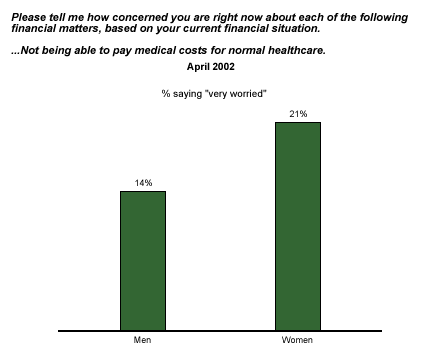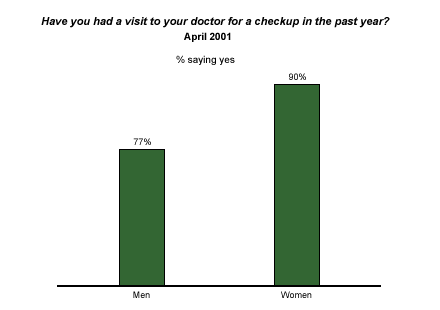Though healthcare reform remains one of the most contentious political issues in the United States, everyone tends to agree on one thing: reliable access to health services must be improved among those who need it most. For a system challenged by limited resources, identifying areas of greatest need must be part of the solution. Perhaps the most important question is: Who is most likely to forgo needed healthcare services?
The most obvious answer is low-income groups who may not have health insurance. But Gallup data highlight the importance of identifying not only groups with a lack of ability to pay for healthcare services, but also those with greater potential need for those services.
Case in point: among all Americans, women appear to be slightly more likely than men to report having forgone medical care during the past year because of cost. A November 2001 Gallup survey* asked, "… have you or a member of your family put off any sort of medical treatment because of the cost you would have to pay?" Twenty-three percent (23%) of women said yes, versus 16% of men, and the data suggest the gender gap persists even when taking a respondent's income into account. Similarly, a 2002 Kaiser Family Foundation and Princeton Survey Research Associates' study found that 24% of women aged 18 to 64 say they have forgone medical care during the past year because of costs, compared to 16% of men.
Women are also more likely to say they are "very worried" about being able to pay medical costs for normal healthcare: 21% of women gave this response in a Gallup poll conducted last month, versus 14% of men.

Does that mean women are less likely than men to access healthcare services at all? Hardly. In fact, the reverse is true -- according to an April 2001 Gallup poll**, 90% of women reported having visited their doctor for a checkup in the past year, compared to only 77% of men. According to the Women's Research and Education Institute, women spend 68% more in out-of-pocket costs for healthcare than men do, with reproductive healthcare services accounting for much of this discrepancy.

Key Points
In the debate over healthcare access, policy-makers should keep in mind that, while disparities in the ability for pay for services are obviously critical, so are differences in need. In fact, Gallup data for men and women suggest that the greater need for services drives concern among Americans about healthcare access more than the lesser ability to pay for services. In the case of women, cost remains a significant barrier to accessing medical services -- nearly one-fourth of whom report having forgone medical care in the past year because of costs. Women are also more concerned about paying medical expenses than men are.
*Results are based on telephone interviews with 1,005 national adults, aged 18 and older, conducted Nov. 8-11, 2001. For results based on the total sample of national adults, one can say with 95% confidence that the margin of sampling error is ±3%.
**Results are based on telephone interviews with 1,000 adults, aged 18 and older, conducted April 11-29, 2001. For results based on this sample, one can say with 95% confidence that the margin of sampling error is ±3%.